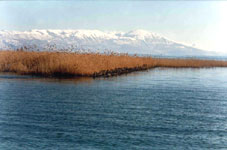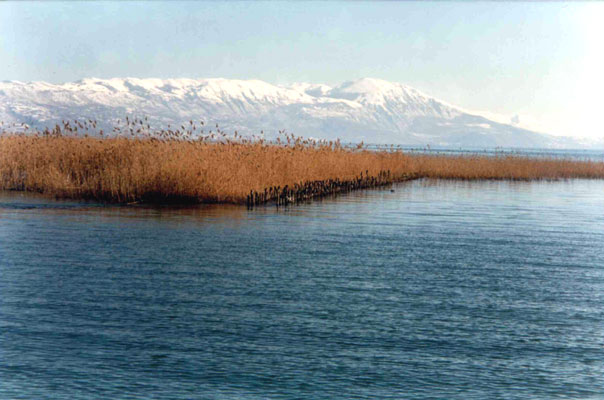| | Robert Elsie | AL Art | AL History | AL Language | AL Literature | AL Photography | Contact | |
Robert Elsie
Texts and Documents of Albanian History
BACK | AL History

Lake Ohrid in winter
(Photo: Robert Elsie).
1257
George Acropolites:
An Albanian Uprising
Historian George Acropolites (1217-1282) was the tutor of Emperor Theodore II Lascaris (r. 1254-1258) and later became rector of the university in Constantinople. His 'Chronicle' of the Nicaean Empire, based to a good degree on first-hand information and personal observations, covers the years 1203-1261.
The Emperor (1) therefore departed for the East and I remained in the western part of the Empire. After setting off from Thessalonika, I arrived in Berrhoia (Veria). The emissaries of the Pope were waiting there, whom I was to send back home on order of the emperor. I remained there for a short time to discharge the papal emissaries and to deal with other business and then, leaving that town, I set off for Albania. Passing through Serbia, Kastoria and the Achrida (Ohrid) region, I arrived in Albania and from there, reached Dyrrachion (Durrës) with the notables of that region. There I remained for eight days and then departed, having given orders as I deemed fit and having made all necessary preparations for the trip, including orders for the city of Durrës itself. I then left Durrës and, passing through Chounavia, crossed the mountain range known as 'Kake Petra' to reach Mate (Mat) and from there, Debre (Dibra). I met all the officials who were on my route: city regents, heads of local military camps and officials of the government administration. From there, I reached Prilep via Kytzabis. The journey from Thessalonika to Prilep I covered in three months during the winter (2). It was December when I left Berrhoia and the end of February when I reached Prilep.
Upon my arrival there, I received word of a most distressing event, i.e. the following: Constantine Chabaron, who had been given supreme command over Albania by the emperor, had been taken prisoner by the Despot Michael, and this, due to the intrigues of Maria, his wife's sister, who had been married to a certain Sphrantzes and was by this time a widow. With her female wiles, she wrapped Chabaron around her finger and won him over with love letters. He was all too susceptible for such things, though he was otherwise a good soldier. Now he was snared in that woman's trap. In view of this fact, Michael now defected openly. I received word of this dramatic turn of events while I was in Prilep. In much distress, I sent a letter to Michael Lascaris, explaining the whole situation to him and telling him that the rebel was nearing Pelagonia. I also asked him to hasten there himself so that we might join forces and decide on a course of action. We thus met in Pelagonia together with Scuterius Xyleas, whom we regarded as a good soldier well disposed to Byzantium. The Emperor Theodor also thought highly of him since the latter had much military experience. He found the emperor's favour not only as a person but also because of his favourable opinions about Byzantine rule. At our meeting we decided upon the following: Michael Lascaris was to set off from Berrhoia where he had pitched his camp, taking all of his army with him, both the Byzantine and Scythian (3) divisions, march to Pelagonia and prepare his forces there. Scuterius Xyleas was likewise to assemble his whole contingent of soldiers, which was even greater in numbers, and meet up with Michael Lascaris. They would then do battle together in the region of Pelagonia. This location was suitable not only for a battle against the Despot Michael, but also for fighting against the Serbs, who, as we learnt, had pledged their military support to Michael.
When the two promised to carry out our decisions, I left them and hastened to Ohrid with my retinue to find out whether I would be able to put the situation in Albania back in order. I resolved to send the imperial sewer, Isaac Nestongus, to Albania and gave the usual orders for him to assume the supreme command. I was well aware of the fact that I could make such decisions without the slightest danger, i.e. that I could replace any of the regional tax and government officials, military commanders or local authorities at whim. I then decided to set off for Albania myself to bring the situation in that country back under control and to find out what the sewer had actually accomplished. On my departure from Albania, I took the sewer and all the forces with me because the Albanian people had acted in advance and had already carried through with their uprising. They had all defected to the turncoat Despot Michael. Since I could see for myself that everything was in turmoil, I left Dibra, where I had spent more days than necessary and where the enemy had encircled us, and took Ohrid by storm with several members of my retinue. In Ohrid I left the sewer to guard the castle and, marching through Prespa and a place called Siderokastron, reached Prilep. There I had the impression of having arrived in a safe haven.
(1) Emperor Theodore II Lascaris.
(2) December 1256 to February 1257.
(3) here probably meaning Slav.[Extract from: Georgii Acropolitae: Opera, Leipzig 1903, p. 140 143. Translated by Robert Elsie. First published in R. Elsie: Early Albania, a Reader of Historical Texts, 11th - 17th Centuries, Wiesbaden 2003, p. 10-11.]
TOP
